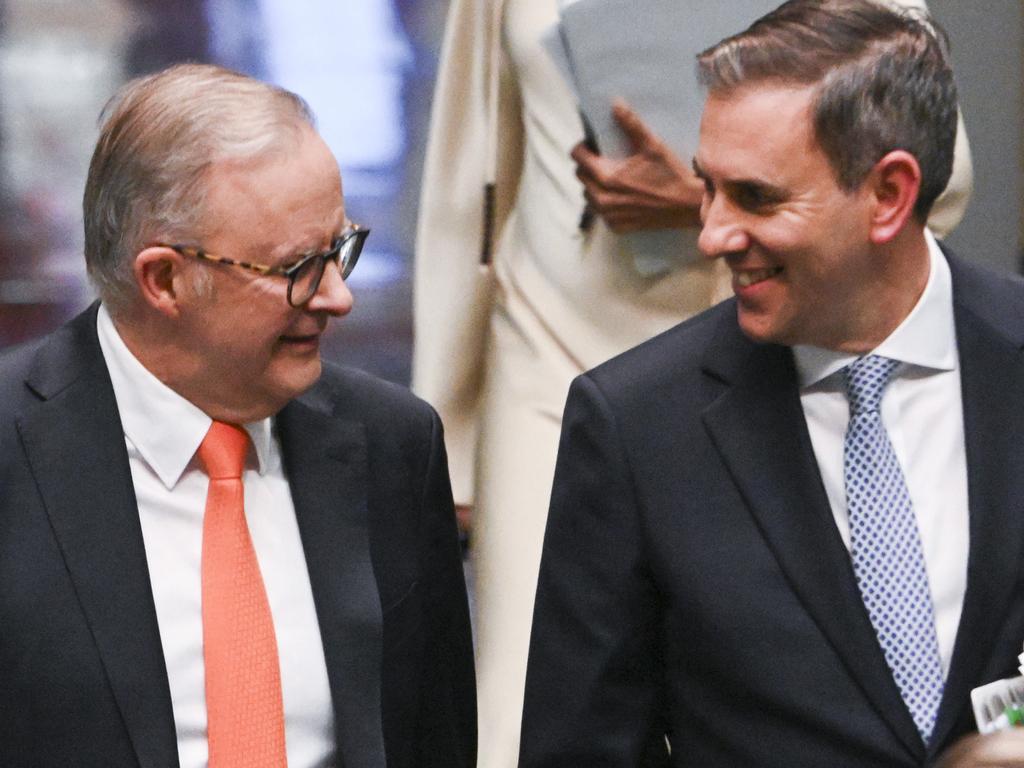Chris Bowen says energy rebate for all aimed at securing RBA rate cut
The Energy Minister has admitted the $300 in power bill relief for every household was a deliberate attempt to buy a lower inflation outcome and put pressure on the RBA to cut rates.

Energy Minister Chris Bowen has given a candid acknowledgement that the $300 in power bill relief for every household was a deliberate attempt to buy a lower inflation outcome and put pressure on the Reserve Bank to cut interest rates.
Speaking on ABC radio national on Wednesday afternoon Mr Bowen said it was appropriate to give energy bill relief to every Australian – including Gina Rinehart and Andrew Forrest – as a cost of living relief measure, just as the government was giving tax relief to all Australians.
But he also said the government was aiming to influence the Reserve Bank. Mr Bowen said the $300 energy bill relief for every household was a decision taken because Labor “wanted to maximise the impact on inflation.”
“You do that by spreading it across as many bills as you can, and you do that effectively by spreading it to every energy bill in the country,” Mr Bowen said.
Jim Chalmers has claimed the decision to give power bill relief to all Australians regardless of need was because targeting the measures was “too costly” to administer.
The Energy Minister, however, provided an alternative reason, saying “it’s the way you maximise the impact on inflation, which will help the Reserve Bank in their job”.
“And we’ve designed this very carefully as to how it will maximise assistance to the Reserve Bank to ensure that they can do their job and the fiscal policy and monetary policy and working hand-in-hand,” Mr Bowen said.
Tuesday’s budget assumed interest rates would not move lower until the middle of 2025, and with cost of living pressures still the number one priority among voters, Labor considers a rate cut over the coming year as essential to its reelection strategy.
But leading economists in recent days have said the RBA would not make interest rate decisions based on short term artificial reductions in consumer prices, and warned that the associated additional spending could add to underlying inflationary pressures – keeping rates higher for longer.
The Treasurer has said cost of living measures in last year’s budget would reduce inflation by 0.75 per cent in the year to June, while the new energy rebates and boost to Commonwealth rent assistance announced on Tuesday would knock another 0.5 percentage point in 2024-25.
Challenger chief economist Jonathan Kearns, a former senior central bank official, said it was true that the government subsidies “mechanically” lowered measured consumer prices.
“However, these measures add to household incomes, particularly of households that will spend a large share of that additional income, and so will contribute to extra spending,” Dr Kearns said.
“Further, temporary cost-of-living relief measures - such as the energy rebate - simply move inflation, pushing it to later years, in particular when the rebate rolls off from July 2025. Despite this, through the miracle of timing, rounding and some other noise, the budget forecasts don’t show a bounce back in inflation,” he said.
Dr Kearns noted the RBA has made it clear it will “look through” what it sees as only temporary movements in prices, suggesting the central bank’s board would not base interest rate decisions on artificial changes in the cost of power bills or rents.
“If anything, the budget adds to, rather than reducing, the excess of demand relative to supply in the economy which is driving persistent inflation and is of concern to the RBA,” he said.
“The inflation dragon still lurks in our future.”
Peter Dutton this week said the Coalition would not oppose the Labor’s cost of living measures, even as he accused the government of “trying to buy themselves an interest rate cut before the election and pretend that everything’s okay.”
“All of the credible economists have said overnight: this (budget) is inflationary, it’s going to drive up inflation, and therefore interest rates,” the Opposition Leader said.
After Ms Bullock earlier this month revealed that a surprise jump in inflation over the first three months of 2024 had put rate hikes back on the board’s agenda, Dr Chalmers on Wednesday said he would not “make predictions or pre-empt decisions taken independently by the Reserve Bank.”
“They will weigh up a whole range of factors and the Commonwealth budget won’t be the only factor that they weigh up,” the Treasurer said.
“I don’t tell Governor Bullock how to do her job. She doesn’t tell me how to do my job,” Dr Chalmers said.






To join the conversation, please log in. Don't have an account? Register
Join the conversation, you are commenting as Logout